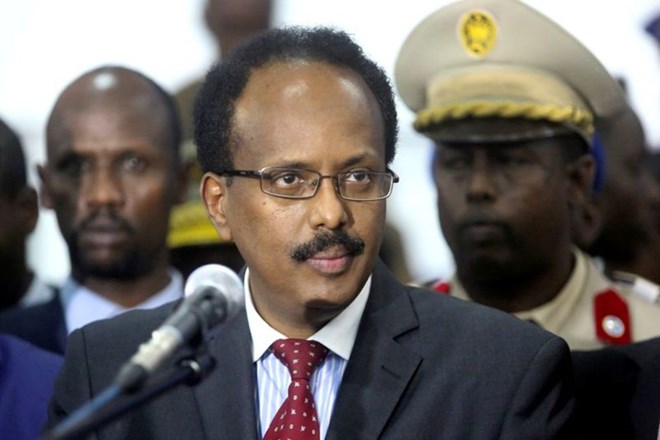
Thursday April 15, 2021
Political crisis deepens as president signs controversial law extending his mandate for two years.

Somalia's President Mohamed Abdullahi Farmajo addresses lawmakers after winning the vote at the airport in Somalia's capital Mogadishu, February 8, 2017. REUTERS/Feisal Omar/
Somalia’s President Mohamed Abdullahi Mohamed, better known as Farmaajo, has signed a controversial law to extend his term by two years despite threats of international sanctions.
The move is the latest in a deepening political crisis that, analysts warn, risks undermining the peace process and stability in the Horn of Africa country.
Here’s what you need to know:
What happened?
The lower house of Somalia’s parliament voted this week to extend Formaajo’s four-year term, which expired in February, for a further two years. Lower house speaker Mohamed Mursal Sheikh Abdurahman said the measure would allow the country to prepare for direct elections.
Farmaajo then signed the disputed mandate extension into law, even though the resolution was not put before the upper house, which would normally be required. Upper house speaker Abdi Hashi Abdullahi immediately slammed the move as unconstitutional, saying it would “lead the country into political instability” and pose security risks.
The extension was also condemned by the United States and European Union over concerns it could deepen divides in the country.
“There is no light at the end of the tunnel,” Mohamed Mubarak, executive director of Marqaati, an anti-corruption NGO that advocates for good governance and transparency in Somalia, told Al Jazeera.
“The president clings on to power and there is no political agreement on the current situation.”
How did we get here?
The president and the leaders of Somalia’s five semi-autonomous federal states had reached an agreement in September to prepare for indirect parliamentary and presidential elections in late 2020 and early 2021.
(Read more about Somalia’s unique electoral system here.)
As part of the agreement, the election planning was set to commence on November 1. But the deal fell apart in the face of squabbles over how to conduct the vote, while talks in February between Farmaajo and the leaders of the country’s federal states failed to break the deadlock.
The leaders of the Jubaland and Puntland federal states accused the president of reneging on the deal and packing the election boards with his allies – a claim Farmaajo denied.
Farmaajo accused the regional leaders of creating the impasse, but opposition groups said they would no longer recognise his authority following the expiration of his term.
Mogadishu resident Abukar Osman Mohamed told AFP news agency the extension was “illegal and it can lead the country into political crisis”.
However, another resident of the capital, Abdulkadir Ahmed Mohamed, supported the move given “regional state leaders couldn’t find any solution.”
Is there a risk of violence?
Farmaajo’s rivals in Jubaland and Puntland have formed an alliance with a powerful coalition of presidential aspirants and other opposition heavyweights in the capital, Mogadishu. They include two former presidents and the speaker of the senate.
The president’s opponents have warned that ruling by decree risks peace and stability in Somalia – a loaded threat given Jubaland and government forces have clashed on the battlefield, and some of Farmaajo’s enemies command clan militias.
There have already been some high-profile defections. Mogadishu’s police chief was fired after trying to shut down parliament before the mandate vote, declaring it a theft of power in a public address.
Analysts fear a splintering of Somalia’s security forces along political and clan lines, as well as the outbreak of fighting in Mogadishu.
“We are in a very dangerous situation,” Mubarak said.
Where could this lead?
Analysts have warned the political squabbling played straight into the hands of al-Shabab, the armed group that controls swathes of Somalia and launches frequent attacks with the aim of overthrowing the internationally recognised government in Mogadishu.
The al-Qaeda-linked fighters have released propaganda videos in recent weeks that seize on the political chaos, casting the country’s elite as power hungry and unfit to govern.
Mubarak said his main concern is that “the rule of law is being erased”.
“The president is using the security forces how he sees fit, so my main concern is that even if Farmaajo is removed or he stays on, this becomes the norm,” Mubarak added.
“Every president will try to extend his mandate, will try to use the security forces to intimidate his enemies, will try to install his puppets in the federal member states,” he said. “I think it’s very dangerous for Somalia’s state-building enterprise.”
How will the world react?
Members of the international community have called for immediate elections to be held.
In a joint statement on Saturday, the United Nations, African Union, European Union and the regional bloc, the Intergovernmental Authority on Development, said they would not support any extension of the president’s term.
US Secretary of State Antony Blinken said on Tuesday that he was “deeply disappointed” by the legislation’s approval, adding that it will pose serious obstacles to dialogue.
“It will compel the United States to reevaluate our bilateral relations with the federal government of Somalia, to include diplomatic engagement and assistance, and to consider all available tools, including sanctions and visa restrictions, to respond to efforts to undermine peace and stability,” he said.
Mubarak noted that world powers have a lot of leverage in Somalia as the government “draws its power” from the international support and recognition it receives.
“We need the international community to put down their feet and demand action,” Mubarak said.
“There should be credible threats of sanctions and action taken, otherwise the president will continue doing what he’s doing. Somalia’s supporters, because of ‘counterterrorism’, will continue supporting the government because there is no other alternative.”